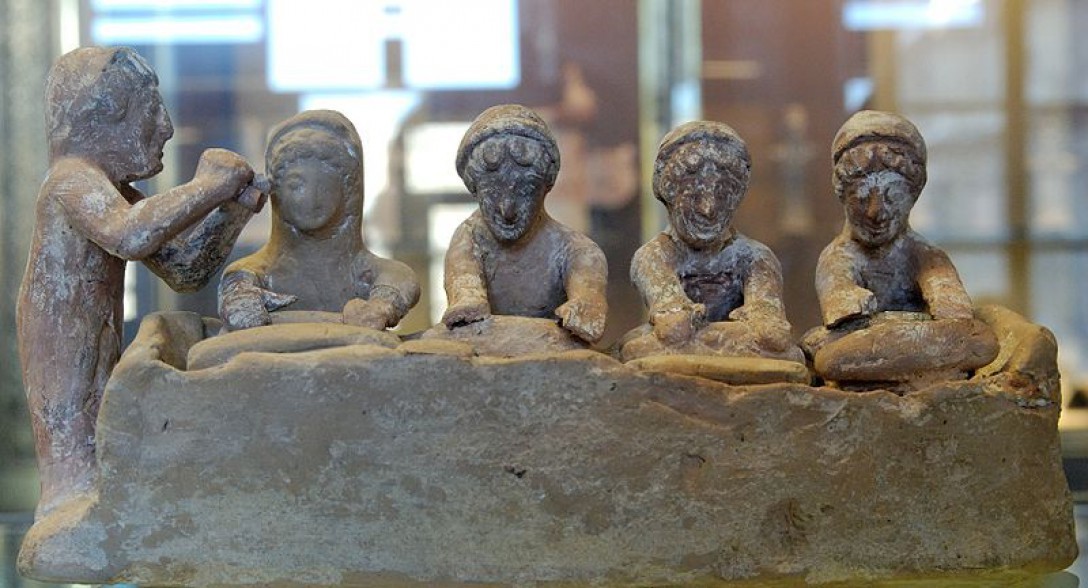In the recent years there is an annual festival for almost every food, be it chestnuts, strawberries, cherries, pies, anchovies, snails etc.
Villages and towns promote the food festivals as a celebration of their local products and culinary tradition, both worth sharing with a wider audience. Τhe truth is that those celebrations have more to do with the desire for regional economic development via events featuring dishes made from local cuisine, than with culinary heritage per se.

Artichoke festival in Iria (Peloponnesos)
In May a plethora of artichoke festivals takes place throughout Greece, and particularly in Crete, Peloponnesos and Tinos, the areas where the finests examples are found.
Dozens of people prepare and cook artichokes for the hundreds of visitors who could sit at the dining tables.
Here are some of the most popular dishes: marinated artichokes, fried artichokes, puffy omelettes with artichokes, sausages and potatoes, artichoke pilavs, artichokes ala polita, moussaka, pastichio, stuffed artichokes, artichokes cooked with peas, broad beans, shrimps, garlic sauce, yogourt, fish, octopus, lamb etc. etc.
It’s clear that, although the dishes selected are considered by cooks and eaters to have their roots in a very old food tradition, many of them have evolved over the past couple of decades.
Two of the most favorite methods of preparation of artichokes are the stuffed artichokes and the artichoke pie.
Sauteed artichoke hearts are stuffed with a rich filling of minced meat and cheese and are topped with a thick nutmeg scented bechamel enriched with cheese, before being baked.
As for the pie, it can be surrounded by a pastry leaf or be a crustless pie. In the second version, it is also called souffle.
Which is interesting because it is not really a soufflé- it has neither a roux as its starting point nor an egg-white foam- but, yes, it is a delectable and delicate “pie”, inflated above the dish by oven heat.
French and Italian influences can be found in these recipes, which have been developed by urban cuisine between 1935 and 1970. They are considered part of the traditional culinary heritage, though.
But “roots”, are both physical and imaginary, I say .
Artichoke pie (Artichoke soufle, agkinaropita)
a buttered 32x22x7 cm baking dish
1 tb olive oil
1 loaf of white bread, crust removed cut into medium slices
3 garlic teeth, chopped
tsp. of fresh thyme
salt
ground black pepper
12-14 poached fresh artichoke hearts
1 1/2 cup grated Graviera cheese (or Gruyere) mixed with 1/2 cup grated kefalotyri cheese (or Parmesan)
1 1/2 cup creme fraiche
3 cups of bechamel sauce
Saute garlic in olive oil until until light brown and fragrant. Make bechamel sauce and set aside. Lay a single layer of bread slices, sprinkle the garlic and season with thyme, salt and pepper. Sprinkle 4 tbs of cheese. Spoon a layer of artichoke pieces, followed by some grated cheese and artichoke pieces. Pour creme fraiche over artichokes and sprinkle with cheese . Cover with bechamel sauce and bake until the surface turns light brown (preheated oven, 200°C, 30-35 minutes).
There is a variation on the recipe with no bechamel sauce. In this case we use 2 cups creme fraiche.
Here is another variation of artichoke pie.
ΓΙΑ ΕΛΛΗΝΙΚΑ ΕΔΩ.





I haven’t made an artichoke pie, as my childen don’t like it but I am sure this would be great.
This rich and delectable artichoke pie is what I would like to try first! Must be wonderful to have access to a fresh supply of artichokes!
The pie sounds nice. Fabulous shot of all these artichokes on the table!
That would be such a great festival to visit! I looked at the video on Youtube.com … a wonderful tradition. I wish I could attend!!